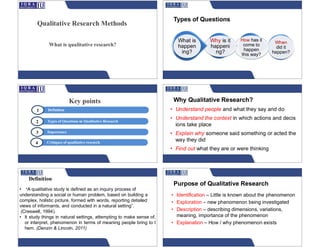
Lecture 1.pdf
- 1. Qualitative Research Methods What is qualitative research? Key points 1 Definition 2 Types of Questions in Qualitative Research 3 Importance 4 Critiques of qualitative research • "A qualitative study is defined as an inquiry process of understanding a social or human problem, based on building a complex, holistic picture, formed with words, reporting detailed views of informants, and conducted in a natural setting”. (Creswell, 1994). • It study things in natural settings, attempting to make sense of, or interpret, phenomenon in terms of meaning people bring to t hem. (Denzin & Lincoln, 2011) Definition Types of Questions When did it happen? How has it come to happen this way? Why is it happeni ng? What is happen ing? • Understand people and what they say and do • Understand the context in which actions and decis ions take place • Explain why someone said something or acted the way they did • Find out what they are or were thinking Why Qualitative Research? • Identification – Little is known about the phenomenon • Exploration – new phenomenon being investigated • Description – describing dimensions, variations, meaning, importance of the phenomenon • Explanation – How / why phenomenon exists Purpose of Qualitative Research
- 2. • Too subjective • Difficult to replicate • Generalisation problematic • Lack of transparency Critique of Qualitative Research 1. Limited data is used to conduct the study 2. The study is always contextualized, hence it is difficult to generalize for broader context 3. The qualitative analysis is more difficult and rigour is required to transcribe and analyse the data 4. In case of variety of forms of the data (text, images, videos, field notes etc.) convergence is difficult Limitations Qualitative Research Differs: Analytical objectives Types of questions they pose Types of data collection instruments they use Forms of data they produce Degree of flexibility built into study design General Framework Quantitative • Seek to confirm hypotheses about phenomena. • Instruments use more rigid style of producing and categorizing responses to Questions. • Use highly structured methods such as questionnaires, surveys, and structured Observation. • Seek to explore phenomena • Instruments use more flexible, iterative style of producing and categorizing responses to questions • Use semi-structured methods such as in-depth interviews, focus groups, and participant observation Qualitative Data Format Quantitative • Numerical (obtained by assigning numerical values to responses) • Concepts are quantified by converting into variables • Secondary data is also in numerical form Qualitative • Textual (obtained from audiotapes, videotapes, and fi eld notes) • Concepts are captured in abstract form • Secondary can have variety of forms like text, images, sounds, videos, etc. Flexibility in Study Design Quantitative • Study design is stable from beginni ng to end • Participant responses do not influence or determine how and which questions researchers ask next • Study design is subject to statistical assumptions and condition Qualitative • Some aspects of the study are flexible • Participant responses affect how and which questions researchers ask next • Study design is iterative
- 3. ▪ Both quantitative and qualitative research methods are useful and needed in business / management / social science or any other field of interest. ▪ Both are important and can be rigorous. ▪ Both can be applied alone or together (e.g. in mixed methods research) in one study. ▪ Selection of any one approach depends upon “research ques tions” “researcher’s interest” and “researcher’s skills”. Which method is better? Qualitative Inquiry Research Designs: Choosing among five approaches, John W Creswell, Sage Publications Doing Qualitative Research – A comprehensive Guide by David Silverman and Amir Marvasti 2008, Sage Publications Qualitative Research – Theory, Method and Practice Edited by David Silverman, Sage Publications Case Study Research by Robert K Yin, Sage Publications Books • https://tqr.nova.edu/websites/ • http://guides.lib.ua.edu/c.php?g=129146&p=843421 • https://study.sagepub.com/salmons Websites International Journal of Qualitative Methods Qualitative Research The Qualitative Report Qualitative Inquiry Quality and Quantity Research Journals • https://www.youtube.com/user/GrahamRGibbs • https://www.youtube.com/watch?v=DRL4PF2u9XA • https://www.youtube.com/watch?v=wbdN_sLWl88 Youtube Links